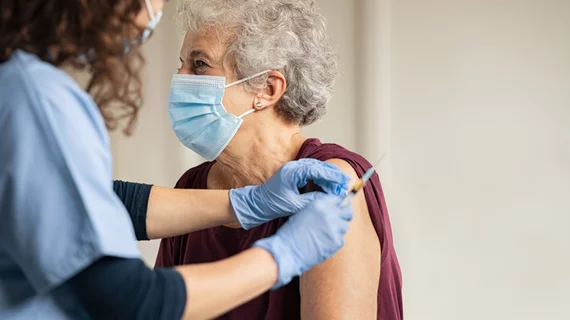Radiologists share keys to reading PET/CT tracer uptake in patients vaccinated against COVID-19
A trio of clinicians on Tuesday shared their keys to accurately interpreting increased radiotracer uptake on PET/CT exams following a patient’s vaccination against COVID-19.
The Colombia-based researchers penned their letter to the editor in response to a set of images published by Radiology in January. Those molecular imaging scans showed new abnormal uptake on the right shoulder and two axillary lymph nodes in a 72-year-old woman with breast cancer who was vaccinated before her scan.
In their letter, published March 9 in Radiology, the group said such abnormal findings have been reported since 2006, including in patients vaccinated against influenza and H1N1.
Radiologists and other clinicians interpreting this increased uptake as a false-positive should look for the following: increased activity of 18F-fluorodeoxyglucose (FDG) in the “ipsilateral” deltoid muscle, whether affected nodules are a normal size, and if a vaccine was administered 14 days before an exam.
Additionally, the standard uptake value in the axillary nodes near the vaccination area should be between 1.3 and 3.4, according to Silvia González-Gómez, a radiology resident at Universidad El Bosque in Bogotá, Colombia, and colleagues.
“Global vaccination against SARS-CoV 2 will make the appearance of this false-positive frequent and the medical community must take this finding into account,” they added Tuesday.
Just last week, University of Massachusetts Medical School/Memorial Health Care oncologists warned of similar findings on PET/CT exams, calling the vaccine-related uptake an “emerging dilemma.”
That group, like many others, said nonurgent exams should be scheduled 4-6 weeks after vaccination in order to best avoid false-positives.

